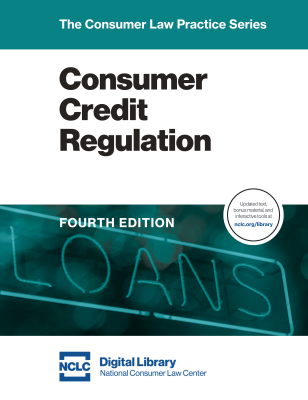The Talent-Nelson Military Lending Act (MLA), 10 U.S.C. § 987, enacted in 2006, imposes a 36% interest rate cap, bans mandatory arbitration, and imposes other restrictions on “consumer credit” extended to service members and their dependents. The MLA thus applies to more than 3 million Americans.
The MLA applies to any individual who, at the time he or she becomes obligated on a consumer credit transaction, is an active duty member of the armed forces or a dependent of an active duty member. Other federal protections (including a 6% interest rate cap) apply where a service member became obligated before going on active duty—see NCLC’s Collection Actions ch. 7.
Effective October 3, the MLA’s Reach Is Significantly Expanded
As described in NCLC’s Consumer Credit Regulation § 2.2.5, the reach of the MLA was sharply restricted by the Department of Defense (DoD) regulation before October 3, 2016. That regulation, 32 C.F.R. § 232, limited MLA coverage of “consumer credit” to only certain payday, auto title pawn, and refund anticipation loans.
New DoD rules with a mandatory compliance date of October 3, 2016, dramatically expand the MLA’s coverage to almost all forms of credit within the Truth in Lending Act’s scope, other than residential mortgages and purchase money loans. See the online version of NCLC’s Consumer Credit Regulation § 2.2.5.2.2.
As a result, for this much wider range of credit, creditors will have to limit their interest rates to a strict 36% cap and cannot require arbitration, among other restrictions. The regulations are found at 32 C.F.R. § 232 and all citations to that regulation in this article will be to the new version of the regulation that goes into effect October 3. A redlined version showing the changes is available at the online version of NCLC’s Consumer Credit Regulation Appx A.1.2. The DoD’s analysis of the regulation can be found in this Federal Register notice.
The new rules apply only to new credit extended on or after the mandatory compliance date (October 3, 2016 for closed-end credit). See 32 C.F.R. § 232.13. Notably, the mandatory compliance date for credit cards and other forms of open end credit is extended to October 3, 2017, and the Secretary of Defense has discretion to further extend the date for credit cards.
Types of Credit Affected by the New Rules
By extending the scope of covered consumer credit, the new rules will have a significant impact on the following types of consumer credit, effective October 3, 2016:
- All payday loans, auto title loans, and refund anticipation loans, even those structured to avoid the old DoD regulations
- Installment loans
- Any non-purchase money loan secured by the consumer’s automobile
- Private student loans
- Loans on the consumer’s future income stream
- Certain overdraft loans (as discussed at 81 Fed. Reg. 58840 (Aug. 18, 2016))
- Any form of tax-time credit
- Purchase money loans where the amount of credit extended exceeds the amount needed to purchase the goods (see 81 Fed. Reg. 58840 at 58841 (Aug. 18, 2016))
- Any other form of consumer credit other than home mortgages, purchase money loans, and credit cards (the restrictions on credit cards do not go into effect until later).
Strict 36% “Military Annual Percentage Rate” Cap
The MLA has a strict 36% “Military Annual Percentage Rate” (MAPR) cap on covered consumer credit offered to servicemembers or their dependents. Effective October 3, the 36% MAPR calculation now treats as finance charges that have to come within the cap certain additional charges not presently included in the calculation of the MAPR. These changes will make it tougher for creditors to evade the 36% interest rate limit. Included as finance charges going forward are credit insurance, debt cancellation insurance, and debt suspension agreement fees, credit-related ancillary products, most application fees, and participation fees. See 32 C.F.R. 232.4(c). See also the online version of NCLC’s Consumer Credit Regulation § 2.2.5.7.2. Creditors that do not update their MAPR calculations can be liable for significant MLA remedies if the MAPR, as properly computed, exceeds 36%.
No Enforceable Arbitration Requirements in Credit Extended to Servicemembers and Dependents
The MLA provides that arbitration requirements are unenforceable in covered credit extended to servicemembers and their dependents. See 10 U.S.C. § 987(f)(4). The MLA also provides that creditors cannot extend consumer credit with respect to which the creditor requires the borrower to submit to arbitration. 10 U.S.C. § 987(e)(3). Thus the MLA both prohibits the inclusion of an arbitration requirement in the credit agreement and also finds any arbitration requirement unenforceable.
Nevertheless, DoD interpretations provide that credit agreements can include an arbitration agreement as long as the agreement contains a savings clause that excludes the agreement’s application to servicemembers or their dependents. See 81 Fed. Reg. 58840 at 58844 (Aug. 18, 2016)). Thus, the MLA is violated where credit agreements extended to servicemembers or their dependents include an arbitration clause without the savings clause. There is no violation if the agreement does contain the savings clause, but the MLA still prohibits the creditor’s attempt to enforce the arbitration agreement.
The dramatic expansion, effective October 3, of the Act’s coverage as to consumer credit also means a dramatic expansion of the types of credit agreements where arbitration agreements are not enforceable and where any arbitration agreement must contain a savings clause. Even if a credit transaction’s MAPR is under 36%, the provisions dealing with arbitration still apply. For example, where a private student loan is extended to a servicemember or dependent after October 3, even if the interest rate is under 36%, any arbitration requirement is unenforceable and any arbitration agreement must have a savings clause.
An arbitration requirement is unenforceable even after the consumer is no longer a servicemember or a dependent of a servicemember, as long as the consumer was covered by the Act when the credit was originated. See 10 U.S.C. § 987(f)(4).
Other Military Lending Act Restrictions
Effective October 3, 2016, the following MLA restrictions (found at 32 C.F.R. 232.8 and more fully described at the online version of NCLC’s Consumer Credit Regulation § 2.2.5.5) now apply to a much broader category of consumer credit:
- Limits on a payday lender rolling over, renewing, refinancing, or consolidating credit;
- Prohibitions of waivers of the right to legal recourse;
- Limits on onerous legal notice provisions in the case of a dispute;
- Limits on the creditor’s access to the consumer’s bank account, such as prohibitions on remotely created checks (telechecks) or remotely created payment orders;
- Limits on use of a vehicle’s title as security for credit;
- Prohibitions on establishment of an allotment to repay an obligation; and
- Prohibition of prepayment penalties.
Consumer MLA Remedies and Creditor Defenses
Any credit agreement, promissory note, or other contract prohibited by the Act is void from its inception. (10 U.S.C. § 987(f)(3)). The supplementary information accompanying the original DoD regulations makes clear that it expects this provision to be enforced in private litigation. See 72 Fed. Reg. 50580 at 50590 (Aug. 31, 2007). A creditor knowingly violating the Act also engages in a misdemeanor and can be fined or imprisoned. (10 U.S.C. § 987(f)(1))
The MLA also has provisions for civil liability. See 10 U.S.C. § 987(f)(5). A person who violates the MLA or regulations with respect to a person is liable to such person for actual damages not less than $500 for each violation, punitive damages, equitable relief, any other relief provided by law, costs, and attorney fees. By the Act’s explicit terms, creditors cannot force into arbitration such actions for civil liability.
Class actions for violations of the MLA should be particularly effective because there can be no arbitration requirement and there is an explicit provision for $500 statutory damages per violation, with no cap. For a discussion as to whether proof of actual damages is a precondition to a $500 statutory damage award, see NCLC’s Consumer Credit Regulation § 2.2.5.10.1.
The MLA provides defenses to the civil liability provided by 10 U.S.C. § 987(f)(5). Significantly, these defenses do not apply to the rule that a noncompliant contract is void, since voiding of the contract is set out in 10 U.S.C. § 987(f)(3). The MLA explicitly provides that the defenses relate to actions brought under (f)(5), but not to a non-complying contract being void under (f)(3).
One defense to civil liability is if the creditor can show by the preponderance of the evidence that the violation was both unintentional and resulted from a bona fide error notwithstanding the maintenance of procedures reasonable adapted to avoid such an error. An error of legal judgment is not a bona fide error. (10 U.S.C. § 987(f)(D)) Another defense is the statute of limitations, but again this defense does not apply to an action to enforce the rule that a prohibited contract is void at its inception. The limitations period is the earlier of two years after discovery of the violation or five years after the violation occurs. (10 U.S.C. § 987(f)(E))
In determining if a borrower is a covered servicemember, a safe harbor is provided if the creditor looks up the borrower in a specified military database or use a credit report. See 32 C.F.R. 232.5(b).
For a more detailed analysis of the MLA and the new regulations, see the online version of NCLC’s Consumer Credit Regulation § 2.2.5. Consumer Credit Regulation also considers other federal and state limits that apply to all consumers (not just servicemembers and their dependents) concerning payday, installment, and other small loans; motor vehicle, manufactured home and other retail installment sales; auto title loans; rent-to-own; refund anticipation and other tax-time loans; “sale” of future payment streams; and credit insurance.


